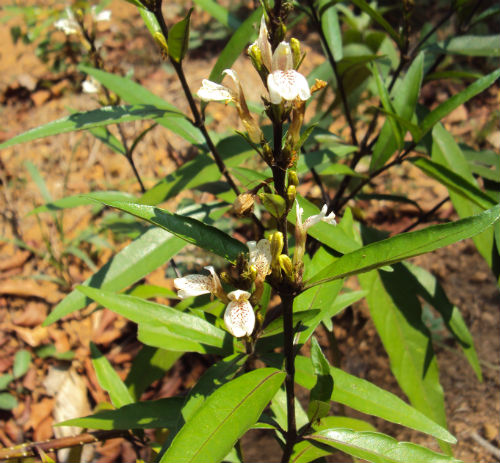Whatever you imagine that world to be like, it could become a reality as soon as next year.
Indonesia is preparing to produce a pill, nearly thirty years in the making, that will allow men – temporarily and without any apparent side effects – to produce sperm that cannot get women pregnant.
The pill is derived from the Justicia gendarussa, which is pervasive in India but also Indonesia’s Papua province, where it has been long been used by male members of a small remote tribe to prevent pregnancy.
After learning about that practice, a research scientist at Surabaya’s Airlangga University, Professor Bambang Prajogo Eko Wardojo, brought the plant to his lab in 1985. He and his colleagues have spent years confirming its effect, isolating its active ingredient and synthesizing it chemically into capsule form.
Human trials of the gendarussa pill have been highly successful, with results showing it effective at a rate comparable to female birth control pills. Testing has also shown that male fertility rates return to normal just 3 days after the subjects stopped taking the pills.
The Indonesian government has invested a good sum of money into the pill’s research and testing, specifically through the country’s National Population and Family Planning Board (BKKBN). In 2013, Airlangga began working with the country’s state-run pharmaceutical company, Indofarma, to begin work on mass-producing the drug, as well as securing the necessary production and distribution licenses. Indofarma later announced that it would be ready to begin production and export of the drug in 2014.
Obviously some delays have prevented the pill from hitting the market just yet – but it’s coming very soon. During a talk at Sunan Giri University in Surabaya last Saturday, the new Minister of Research, Technology and Higher Education, Dr. M. Nasir, spoke about how the government was committed to utilizing the research done by Indonesian universities by connecting them to appropriate companies.
Specifically, Nasir mentioned the male birth control pill from Airlangga University as one example of research that would be produced domestically and massively commercialized in the near future. Pharmaceutical companies in China and the United States have also shown strong interest in obtaining the rights to produce the drug in their countries.
It may take many years of additional testing before it could reach consumers in America. However, the gendarussa pill is likely to be classified as herbal medicine in Indonesia. That mean that, although it would not require the same level of scrutiny as regular pharmaceuticals that go to market here, it would still have to meet the safety standards of Indonesia’s Food and Drug Monitoring Agency (BPOM) and Health Ministry. As much of the testing on the pill has already been completed, there is little preventing it from becoming available to Indonesians consumers sometime next year.
Gendarussa in action

The humble Justica gendarussa plant
The Justicia gendarussa first came to the attention of Indonesian researchers after they heard anecdotal evidence that men belonging to a certain tribe in Papua were using it as a contraceptive. They would boil the leaves in water and then drink the water 30 minutes before intercourse. Apparently it was a godsend for the tribesmen – in their culture they were not allowed to get their wives pregnant until after they had fully paid off their dowries.
Airlangga University’s Prof. Bambang, who has been studying the contraceptive effects of gendarussa for nearly three decades, says the plant’s active ingredient disrupts three key enzymes in sperm, making them unable to penetrate the eggs during the fertilization process.
“The chemical will not affect the quality or the quantity of sperm produced because it only targets the enzymes,” he told the Jakarta Post.
Clinical testing of the drug has taken place since 2010. Phase three testing in 2012 included 350 couples, with 186 taking the pill and the others taking a placebo. The success rate of the pill was 99.96 %.
A pill with the potential to change the world
In a long and amusing article in The Guardian, Tim Lewis takes a look at efforts to create male contraception, efforts that go all the way back to the 5th century BC (and a successful method that involved men soaking their testicles in scalding hot water).
Lewis notes that there have been many attempts by scientists to create a male birth control pill in recent years, but many of those attempts fizzled out. Sometimes the underlying science just wasn’t there, but sometimes chauvinistic ideals about contraception and how much effort men wanted to put into it led to a lack of funding and support.
But there is definitely interest in a male birth control pill, as shown by survey results (55% of men across four continents said they would be interested in such a pill, according to one 2005 survey) and the numerous ongoing attempts by western scientists to crack that nut (as it were). But their most promising efforts are still many years, if not decades, off from bringing a product to market. And it looks like Indonesia is poised to beat them all to the punch.
As mentioned before, it’s likely that the pill will be released in Indonesia long before other countries, which Lewis says will likely lead “some eager men… to find ways to import the pills direct from Indonesia.”
While possibilities for exporting the pill would probably be great, there is a definite need for them in Indonesia, which faces a potential population crisis in the near future due to a lack of family planning programs and education after the end of the New Order era (one of the few things that Suharto actually got right).
Those gendarussa capsules may be a much easier pill for men to swallow in Indonesia and other countries where condoms have the unfortunate stigma of being attached to western sexual liberalism (i.e. “free love”).
Indonesia is about to unleash a family planning solution that is herbal, non-hormonal, non-invasive, temporary, has no known side effects and is entirely Asian in origin. And it’s just for men. What kind of effect do you think it’s going to have on the world? Join the discussion on our Facebook page and let us know what you think.
Read (and share) more great stories from Coconuts Jakarta
Dolly, once the biggest red light district in Southeast Asia, was closed last year, but its legacy lives on. Read about what happened after the city’s enormous sex trade went underground as we interview the pimps and prostitutes of Surabaya’s most infamous neighborhood in our series, “Dolly Revisited”
Dolly Revisited Part 1: Welcome to the jungle
Dolly Revisited Part 2: “Where sperm come to die”

Sumatra Burning: How our insatiable appetite for palm oil is turning our skies black (VIDEO)






Reader Interactions